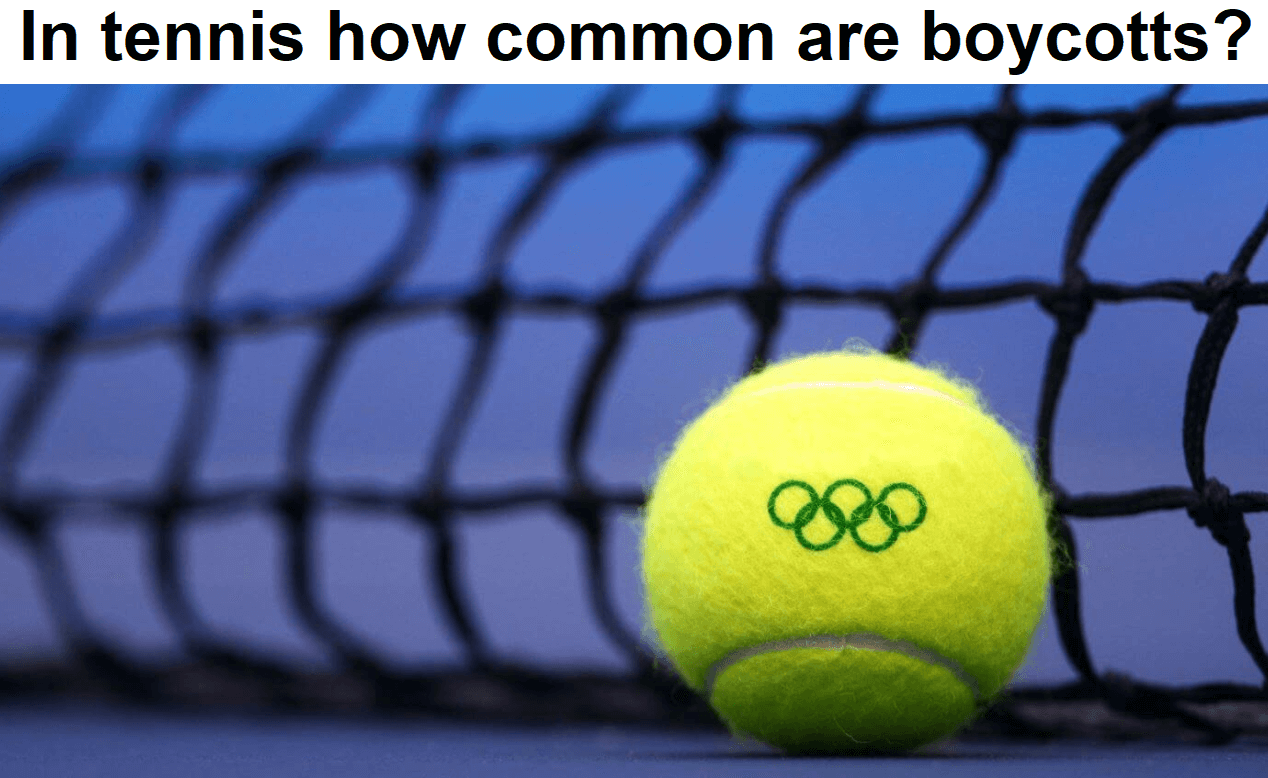

Boycotts in tennis have gained limelight owing to personal, systemic or political reasons. Five of the most notable boycotts in tennis are detailed below.
1) The Williams Sisters & Indian Wells Boycott
Serena Williams, aged, 19 was having a good run at the desert in 2001 and was looking strong for capturing her 19th career title. When she reached the quarter-finals, she defeated second seed Lindsay Davenport in straight sets and setup a clash with her elder sister. On the day of the semi-finals, 4 minutes before the start of the match, Venus Williams made an announcement. She stated that she had to withdraw from the event due to tendinitis.
The spectators were enraged at Venus’ statement and didn’t waste much time in striking a flurry of boos from the stands. Later in the day, the sisters’ father, Richard Williams was accused of fixing the matches for the sisters.
“Everyone has their own opinion,” said a cool headed Venus in the press when she was asked about the accusations made on her father. When a Reuters’ reporter asked Richard about Venus’ injury, he said, “From now on, I don’t speak English. I don’t speak English.” Richard’s statement raised many eyebrows.
On the day of the finals, Serena Williams walked on the court with Kim Clijsters; but the main attractions at the start of the finale were in the support box. Venus and Richard Williams walked down the flight of stairs to take their seats. They were welcomed by decibels of gaucherie. In a protesting manner, Richard Williams shook his fist towards the crowd. The match commenced and Clijsters took the first set 6-4. But a mentally strong Serena fought her opponent and more importantly, the crowd, capturing the title yet again. The triumph was received with mixed reactions.
A few hours later, Richard Williams stated that Indian Wells has “disgraced America” as he heard racist comments from the crowd being hurled against him and his elder daughter. Despite this strong accusation, no person from the crowd (till date) is reported to have said or heard any such comments. Additionally, Serena’s double faults had become a new excuse for the crowd to cheer.
Clearly, there was no home-advantage for the then 19 year old. Understandably, the Williams decided to boycott the event. In 2015, Serena returned to the Indian Wells field. The following year, Venus followed her younger sibling’s footsteps. Since their boycott, ended, Serena’s best result was finishing as the runner-up in 2016 whereas Venus’ best result was reaching the quarter-finals last year where she lost to eventual champion Elena Vesnina.
2) 1977 Wimbledon Boycott of ATP players
In 1973, Nikola Pilic, the Yugoslavian No.1 player and a member of the Handsome Eight finished as the runner-up at the Roland Garros. He decided to carry forward his form in the circuit’s tournaments rather than competing at the Davis Cup. The International Lawn Tennis Federation was not happy with Pilic withdrawing from the Davis Cup at the last moment.
They enforced a 9 month suspension on Pilic. Protests from Pilic and fellow ATP players led to Pilic’s suspension decrease from 9 months to 1 month. Despite the decrease in suspension, it meant that Pilic won’t be able to compete in the Wimbledon championships the following month. To support Pilic, 81 of Pilic’s fellow competitors who were a member of the recently formed All Tennis Professionals (ATP) withdrew from the Championships. This included 13 of the top 16 seeds.
Despite the inclusion of top seed Ilie Nastase in the main draw, the Romanian lost in the early rounds. It is now said that Nastase purposefully lost in the early rounds to support Pilic and his fellow ATP players. The 1973 event was won by Jan Kodes who defeated Alex Metreveli in the finals.
3) 1974 India boycotts Davis Cup finals
The apartheid policy of the South African government had barred the nation from playing the Olympics from 1964 up until 1992. It was during those years when even the tennis playing nations protested against this policy. In the 1974 Davis Cup, India, a strong team led by the Amritraj brothers had defeated the defending champions, Australia. They had taken a step further went after defeating the Soviet Union. “It was two brothers taking their country to the final, which had never happened, and this was for a billion people. It was past the goose-bump feeling.”- Vijay Amritraj
Upon clinching the finals berth, India, a strong contender for the Davis Cup title saw itself drawn against Africa for the Davis Cup trophy. But, the apartheid policy became the net between India and Africa. It was Indira Gandhi, the then Prime Minister of India who decided to throw the ball into the net. Acting against the apartheid policy, India refused to travel to South Africa to play the finals. South Africa were declared the winners without playing a single point in the final. “I think it was a bad call. The only time we had an excellent chance of winning the Davis Cup, we gave it away.”- Anand Amritraj
4) Israel, Dubai, Roddick and the 2009 Dubai boycott
Shahar Pe’er was the 48th ranked player in the world. In 2009, conflicts arose between Israel and Gaza causing war situations in both regions. Shahar Pe’er was scheduled to play at Dubai but the UAE refused to give her a visa. When tournament director, Salah Tahlak was asked to explain the denial of the visa, his reasons were baseless. This angered a range of players on both the ATP and WTA circuit. Defending men’s singles champion, Andy Roddick decided to boycott the event.
Ana Ivanovic, Venus Williams and Elena Dementieva publicly supported Shahar Pe’er and considered the Dubai event’s actions as false and unjustified. The following year, Pe’er was allowed to play and the Israeli made a ferocious run, reaching the last four. En route, she defeated Yanina Wickmayer (13th seed), Virginie Razzano, Caroline Wozniacki (Top seed) and Li Na (Eighth seed). The Israeli’s run ended in the semis where she was defeated by eventual champion Venus Williams.
5) Tunisia vs Israel: 2013 Tashkent Challenger tournament
Malek Jaziri, now a top 100 player in the world and Tunisia’s best tennis player faced a major setback in his struggling days 5 years ago in a challenger tournament. In a Challenger tournament played at Tashkent, Malek Jaziri was through to the quarter-finals. He was drawn against Israel’s Amir Weintraub. Political indulgence yet again affected the tennis world. Before his semi-final match, Jaziri received a mail from the Tunisian Tennis Federation which read:
“Following a meeting this afternoon with the Ministry of Youth and Sports, I have the immense regret to inform you that you are ordered not to play against the Israeli player.”
Jaziri withdrew from the match saying that he had a knee injury thereby masking the actual reason of his withdrawal. The International Tennis Federation later stated that the Tunisian Tennis Federation had broken the code and hence was suspended from the Davis Cup for one year.
Various reasons have led to boycotts in tennis. Wisdom lies in keeping the tennis players and their tennis in the peripheries of the game rather than raising various non-tennis conflicts disrupting the poised state of the sport.





